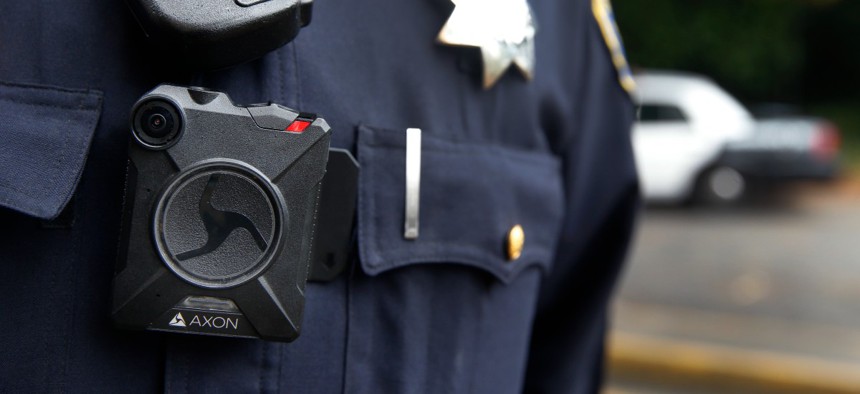Interior’s Body Camera Policy is not Finalized Despite Years of Use, Watchdog Says

Paul Chinn/The San Francisco Chronicle via Getty Images
Not all Department of Interior bureaus using body cameras have finalized and implemented their policies, which often were not in compliance with the agency’s overall policy or standards.
The Office of the Inspector General for the Department of the Interior issued a departmentwide inspection report last week finding that the agency “has not finalized its [interim] body camera policy and not all of its bureaus have finalized and implemented their body camera policies.”
Specifically, the agency has not issued a finalized body camera policy, despite bureaus using body cameras since at least 2016. According to OIG, while it was informed in March 2020 that the body camera policy was in line to become permanent, the watchdog determined that the policy “had never been routed through the necessary approval process used at the relevant time.” As a result, there is no record of the policy in DOI’s data tracking system, as there should be if the correct procedures were followed. However, in May 2021, DOI updated its interim 2017 policy, which included changes made to reflect recommendations in OIG’s 2018 report.
That 2018 OIG report found that DOI’s draft body camera policy did not meet key industry standards in areas like data quality, systems security and privacy. Additionally, OIG found that the policies of bureaus varied and were not consistent.
In the recent report, OIG discovered that not all of the bureaus that use body cameras—namely, the Bureau of Indian Affairs, Bureau of Land Management, U.S. Fish and Wildlife Service, National Park Service and the U.S. Park Police—have updated their policies to reflect the interim DOI policy. Therefore, “these bureaus continue to operate under policies that are not consistent with minimum standards established in the department’s interim body camera policy.”
In particular, the bureaus’ body camera policies did not have: provisions for supervisors to review body camera recordings, prohibitions on the manipulation or deletion of body camera recordings, requirements for follow-up training each year and the identification of technology administrators and training managers.
The bureaus attributed these shortcomings to “staff shortages, retirements and the priorities of the previous administration.” However, OIG stated that no matter the reason, “by failing to incorporate these minimum standards in their body camera policies, bureaus are unable to demonstrate that they maintain the strict control over body camera devices and recordings that is necessary to ensure the integrity of their body camera programs.”
OIG stated that DOI must finalize its policy to not only provide guidance and consistency, but also to clarify expectations for the use of body cameras and to provide transparency. Moreover, OIG stressed the importance of finalizing the policy because of the increased scrutiny regarding the use of body cameras. According to OIG, “the department cannot achieve its objective of having body camera programs that are designed to support law enforcement strategies to improve public and officer safety.”
OIG added that an executive order in May of this year requires federal law enforcement agency heads to ensure their policies comply with the Department of Justice’s requirements from June 2021 and for these policies to be made public, among other things. Therefore, the DOI and bureaus’ policies should also comply with these requirements.
OIG issued two recommendations for DOI. The first is to develop reasonable milestones to finalize and implement the agency’s body camera policy. The second is for the bureaus that use body cameras to update and finalize their policies within a specific time period to comply with the interim or final DOI policy.
DOI concurred with the recommendations. The agency gave Oct. 14, 2022 as a target implementation date to finalize its policy. DOI also stated that it will work with the bureaus’ law enforcement programs and the Office of the Solicitor to make sure bureau policy is implemented by Dec. 31, 2022.






